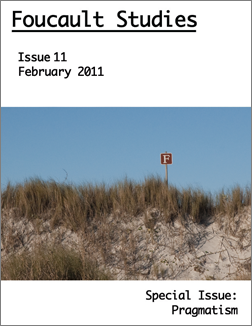Politicizing the Personal: Thinking about the Feminist Subject with Michel Foucault and John Dewey
DOI:
https://doi.org/10.22439/fs.v0i11.3206Abstract
While the varied theoretical frameworks of second wave feminism made possible critical interrogation of societal patterns of domination and oppression in view of the transformative goal of liberation, Michel Foucault’s conceptualization of power shifts contemporary feminist thought away from this binary field of relations towards more fundamental questions about gender constitution. Indeed, from the perspective of popular culture it would seem that challenges to rigid gender roles were a thing of the past, to which freedom and certain kinds of gender malleability were intrinsically tied. In fact gender roles continue to be defined in strict opposition to each other and sexist attitudes and practices continue, although increasingly disguised and unacknowledged. If liberation from the strictures of patriarchy is nothing but a lost illusion from the second wave, is there nonetheless a need for a resurgent feminist consciousness today? In this paper, I argue that this is the case, and attempt to show that “the work of the intellect” described by Foucault, must first be catalyzed by an experiential disruption, leading to recognition of what pragmatist philosopher John Dewey described as the “problematic situation.” While both Foucault and Dewey emphasize the necessity of problematization, Dewey’s methodology includes focus on envisioning desired outcomes. Here, my aim is not to resurrect an old idea of unconditioned liberation, but merely to reconsider whether and how experiential disruption and subsequent consideration of the problem might lead to a shift in social and self-consciousness, and create the possibility for change.Downloads
Published
2011-02-01
How to Cite
Gayman, C. (2011). Politicizing the Personal: Thinking about the Feminist Subject with Michel Foucault and John Dewey. Foucault Studies, (11), 63–75. https://doi.org/10.22439/fs.v0i11.3206
Issue
Section
Special Issue on Foucault and Pragmatism
License
Authors retain copyright to their work, but assign the right of the first publication to Foucault Studies. The work is subject to a CC BY-NC-ND 4.0 license, but despite these restrictions, authors can take for granted that Foucault Studies will permit articles published in Foucault Studies to be translated or reprinted in another format such as a book providing a full reference is made to Foucault Studies as the original place of publication.



